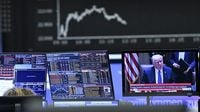Global markets experienced a significant downturn on Friday, April 4, 2025, as fears escalated regarding the potential for a trade war between the United States and China. This panic was triggered by the Chinese government's announcement to impose additional tariffs on American goods in retaliation for new tariffs imposed by President Donald Trump.
Lan Fo’an, the Chinese Minister of Finance, revealed that starting April 10, China would impose a 34% tariff on all American imports. This announcement came just two days after Trump declared that the U.S. would increase customs taxes on Chinese products by an additional 34%, on top of a 20% hike previously announced in March. The Chinese government urged the U.S. to cancel these unilateral tariffs, warning that they could jeopardize global economic development.
In response to Trump's aggressive tariff strategy, which raised the total duties on Chinese goods to 54%, China also announced it would impose export controls on seven rare earth elements, including gadolinium and yttrium, which are critical for various technologies.
As markets reacted to this escalating trade conflict, European stock exchanges saw sharp declines. By approximately 2:30 PM GMT, the Frankfurt Stock Exchange plummeted by 4.57%, while Paris and London fell by 4.25% and 4.53%, respectively. Other major markets, including Zurich and Milan, faced similar declines, with Milan dropping by 6.82% and Madrid by 6.09%. Wall Street was not spared either, with the Dow Jones Industrial Average falling by 3.39%, the Nasdaq by 3.81%, and the S&P 500 by 3.90%.
On the heels of this turmoil, futures contracts for the three main U.S. indices indicated a bleak opening, reflecting the market's lack of confidence. Analysts noted that if the tariffs remain in place without negotiation, the global economy could face a crisis reminiscent of the oil shocks of the past.
Vincenzo Vedda, an investment director at DWS, commented on the situation, stating, "If none of the announced tariffs are reversed by negotiations in the coming weeks, the global economy risks entering a crisis akin to a 'oil shock' by mid-year." He also pointed out that negotiations would be challenging and protracted, which could lead to a continued decline in investor confidence.
The volatility index, known as the VIX or “fear index,” surged by 44% to 43.35 points, marking its highest level since January 2020, the onset of the COVID-19 crisis. The uncertainty surrounding the tariffs has led to a rush towards safer assets, with investors flocking to government bonds and gold.
On the commodities front, oil prices took a hit as well, with North Sea Brent crude dropping by 7.41% to $64.90 per barrel, while its U.S. counterpart, WTI, fell by 8.20% to $61.86. This reflected concerns over a potential recession impacting global demand for oil.
In the banking sector, the repercussions of the trade war were stark. Major European banks suffered significant losses, with Société Générale falling by 10.9%, BNP Paribas by 7.1%, and Deutsche Bank by 9%. The prospect of lower interest rates and a recession raised alarms over the profitability of these institutions.
In the United States, financial stocks also faced pressure, with Morgan Stanley, Lazard, and Bank of America all seeing declines exceeding 6%. The market's reaction to Federal Reserve Chairman Jerome Powell's comments, which hinted at broader economic implications from the tariffs, further compounded investors' fears. Powell noted that the taxes on imported goods would be more extensive than anticipated, likely leading to increased inflation and slower growth.
As the situation continues to unfold, analysts are keeping a close eye on upcoming economic reports, including the monthly U.S. employment figures, which could provide further insight into the health of the economy amidst these turbulent times.
In summary, the trade war between the U.S. and China has entered a new phase, with both nations imposing significant tariffs on each other's goods. The resulting uncertainty has led to widespread panic in financial markets, raising concerns about the potential for a global economic downturn.





